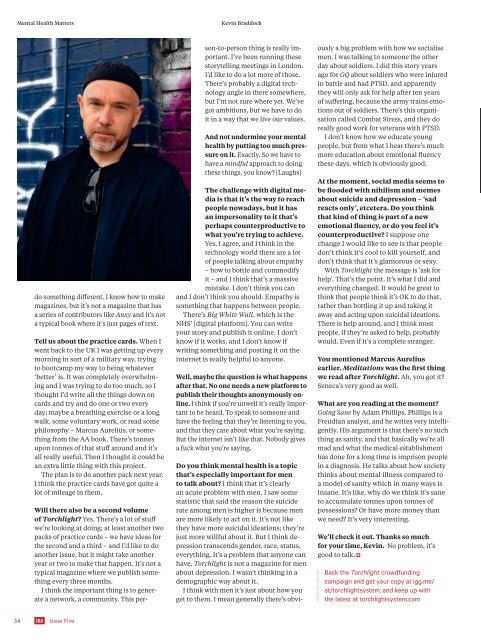LOLA Issue Five
Issue Five of LOLA Magazine. Featuring the people and stories that make Berlin special: Tricky, Shahak Shapira, Romano, Andy Kassier, Ida Tin, Kolja Kugler and more.
Issue Five of LOLA Magazine. Featuring the people and stories that make Berlin special: Tricky, Shahak Shapira, Romano, Andy Kassier, Ida Tin, Kolja Kugler and more.
You also want an ePaper? Increase the reach of your titles
YUMPU automatically turns print PDFs into web optimized ePapers that Google loves.
Mental Health Matters<br />
Kevin Braddock<br />
do something different. I know how to make<br />
magazines, but it’s not a magazine that has<br />
a series of contributors like Anxy and it’s not<br />
a typical book where it’s just pages of text.<br />
Tell us about the practice cards. When I<br />
went back to the UK I was getting up every<br />
morning in sort of a military way, trying<br />
to bootcamp my way to being whatever<br />
‘better’ is. It was completely overwhelming<br />
and I was trying to do too much, so I<br />
thought I’d write all the things down on<br />
cards and try and do one or two every<br />
day; maybe a breathing exercise or a long<br />
walk, some voluntary work, or read some<br />
philosophy – Marcus Aurelius, or something<br />
from the AA book. There’s tonnes<br />
upon tonnes of that stuff around and it’s<br />
all really useful. Then I thought it could be<br />
an extra little thing with this project.<br />
The plan is to do another pack next year.<br />
I think the practice cards have got quite a<br />
lot of mileage in them.<br />
Will there also be a second volume<br />
of Torchlight? Yes. There’s a lot of stuff<br />
we’re looking at doing; at least another two<br />
packs of practice cards – we have ideas for<br />
the second and a third – and I’d like to do<br />
another issue, but it might take another<br />
year or two to make that happen. It’s not a<br />
typical magazine where we publish something<br />
every three months.<br />
I think the important thing is to generate<br />
a network, a community. This person-to-person<br />
thing is really important.<br />
I’ve been running these<br />
storytelling meetings in London.<br />
I’d like to do a lot more of those.<br />
There’s probably a digital technology<br />
angle in there somewhere,<br />
but I’m not sure where yet. We’ve<br />
got ambitions, but we have to do<br />
it in a way that we live our values.<br />
And not undermine your mental<br />
health by putting too much pressure<br />
on it. Exactly. So we have to<br />
have a mindful approach to doing<br />
these things, you know? [Laughs]<br />
The challenge with digital media<br />
is that it’s the way to reach<br />
people nowadays, but it has<br />
an impersonality to it that’s<br />
perhaps counterproductive to<br />
what you’re trying to achieve.<br />
Yes, I agree, and I think in the<br />
technology world there are a lot<br />
of people talking about empathy<br />
– how to bottle and commodify<br />
it – and I think that’s a massive<br />
mistake. I don’t think you can<br />
and I don’t think you should. Empathy is<br />
something that happens between people.<br />
There’s Big White Wall, which is the<br />
NHS’ [digital platform]. You can write<br />
your story and publish it online. I don’t<br />
know if it works, and I don’t know if<br />
writing something and posting it on the<br />
internet is really helpful to anyone.<br />
Well, maybe the question is what happens<br />
after that. No one needs a new platform to<br />
publish their thoughts anonymously online.<br />
I think if you’re unwell it’s really important<br />
to be heard. To speak to someone and<br />
have the feeling that they’re listening to you,<br />
and that they care about what you’re saying.<br />
But the internet isn’t like that. Nobody gives<br />
a fuck what you’re saying.<br />
Do you think mental health is a topic<br />
that’s especially important for men<br />
to talk about? I think that it’s clearly<br />
an acute problem with men. I saw some<br />
statistic that said the reason the suicide<br />
rate among men is higher is because men<br />
are more likely to act on it. It’s not like<br />
they have more suicidal ideations; they’re<br />
just more willful about it. But I think depression<br />
transcends gender, race, status,<br />
everything. It’s a problem that anyone can<br />
have. Torchlight is not a magazine for men<br />
about depression. I wasn’t thinking in a<br />
demographic way about it.<br />
I think with men it’s just about how you<br />
get to them. I mean generally there’s obviously<br />
a big problem with how we socialise<br />
men. I was talking to someone the other<br />
day about soldiers. I did this story years<br />
ago for GQ about soldiers who were injured<br />
in battle and had PTSD, and apparently<br />
they will only ask for help after ten years<br />
of suffering, because the army trains emotions<br />
out of soldiers. There’s this organisation<br />
called Combat Stress, and they do<br />
really good work for veterans with PTSD.<br />
I don’t know how we educate young<br />
people, but from what I hear there’s much<br />
more education about emotional fluency<br />
these days, which is obviously good.<br />
At the moment, social media seems to<br />
be flooded with nihilism and memes<br />
about suicide and depression – ‘sad<br />
reacts only’, etcetera. Do you think<br />
that kind of thing is part of a new<br />
emotional fluency, or do you feel it’s<br />
counterproductive? I suppose one<br />
change I would like to see is that people<br />
don’t think it’s cool to kill yourself, and<br />
don’t think that it’s glamorous or sexy.<br />
With Torchlight the message is ‘ask for<br />
help’. That’s the point. It’s what I did and<br />
everything changed. It would be great to<br />
think that people think it’s OK to do that,<br />
rather than bottling it up and taking it<br />
away and acting upon suicidal ideations.<br />
There is help around, and I think most<br />
people, if they’re asked to help, probably<br />
would. Even if it’s a complete stranger.<br />
You mentioned Marcus Aurelius<br />
earlier. Meditations was the first thing<br />
we read after Torchlight. Ah, you got it?<br />
Seneca’s very good as well.<br />
What are you reading at the moment?<br />
Going Sane by Adam Phillips. Phillips is a<br />
Freudian analyst, and he writes very intelligently.<br />
His argument is that there’s no such<br />
thing as sanity, and that basically we’re all<br />
mad and what the medical establishment<br />
has done for a long time is imprison people<br />
in a diagnosis. He talks about how society<br />
thinks about mental illness compared to<br />
a model of sanity which in many ways is<br />
insane. It’s like, why do we think it’s sane<br />
to accumulate tonnes upon tonnes of<br />
possessions? Or have more money than<br />
we need? It’s very interesting.<br />
We’ll check it out. Thanks so much<br />
for your time, Kevin. No problem, it’s<br />
good to talk.<br />
Back the Torchlight crowdfunding<br />
campaign and get your copy at igg.me/<br />
at/torchlightsystem, and keep up with<br />
the latest at torchlightsystem.com<br />
34 <strong>Issue</strong> <strong>Five</strong>









